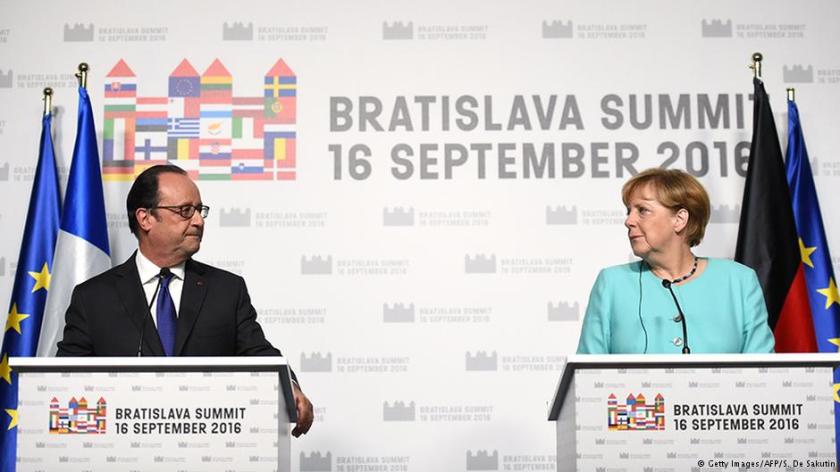Giuseppe Sandro Mela.
2016-09-17.
Sono rimasti loro due, che nel 2017 saranno trombati alle elezioni.
«Some say the very existence of the bloc is under threat. This has focused the minds of the member states whose leaders gathered for a key summit in Bratislava. They are desperate to come up with a game plan for salvaging the European project.» [Deutsche Welle]
*
«France is making the main effort on European defence but it cannot be alone and does not want to be alone,» [The Local]
*
«Hungarian Prime Minister Viktor Orban declared the summit a failure because members had not been able to change “Brussels’ refugee policy,” …. Orban also presented his European colleagues with a paper that contained Visegrad group proposals for “flexible solidarity …. Merkel conceded that this might be a way to attain results»
*
«Italian Prime Minister Matteo Renzi was also dissatisfied with the summit. Although Merkel and Hollande recently traveled to Italy to lend their support in difficult times, Renzi did not want to appear alongside the two leaders for their final press conference»
*
«The UK’s eventual departure from the European Union was the ostensible reason for the summit, but in the end it was only addressed as an afterthought»
*
Il Summit di Breslava ha sancito l’inizio della decomposizione dell’Unione Europea.
In primavera Mr Hollande ed i socialisti francesi usciranno dalla scena politica nazionale ed europea, ed a settembre Frau Merkel scomparirà anch’essa dall’agone politico.
Il 2017 proseguirà l’anno elettorale tedesco. Il 26 marzo andrà al voto Saarland, seguita il 7 maggio dallo Schleswig-Holstein ed il 14 maggio dalla Nordrhein-Westfalen. Se le attuali proiezioni e sondaggi si confermassero, tutto il quadro politico tedesco risulterebbe completamente differente da quello attuale. Una svolta epocale.
-
Nordrhein-Westfalen. Spd -8.5, Cdu invariata, AfD 13%. 2016-09-17
-
Herr Martin Schulz. Altra testa socialista che sta per cadere. 2016-09-15
-
Blue-Chip tedesche non assumeranno più di 100 migranti sul milione arrivato. 2016-09-14
-
L’Era Merkel è finita. Il Fantasma di Kohl. Der Spiegel. 2016-09-13
-
Germania. Comunali in Bassa Sassonia. Spd -3.7 punti percentuali. 2016-09-12
-
Germania. Ritorna il termine ‘Bürgerkrieg’, Guerra Civile. 2016-09-11
-
Berlino. Große Koalition kaputt. AfD al 15%. 2016-09-09
*
La sconfitta della Weltanschauung franco-tedesca, ossia del socialismo europeo, è stata ben evidenziata dal rifiuto di Mr Renzi di partecipare alla conferenza stampa finale.
Sono rimasti da soli Mr Hollande e Frau Merkel: Mr Renzi ha preso spunto dal comportamento del gen. Badoglio l’otto settembre. Tradire gli alleati è una sua specialità
* * * * * * *
Chiunque abbia a cuore la mutazione della visione politica dell’Unione Europea dovrebbe leggere con molta attenzione tutta la documentazione allegata.
*
Il sito dello European Council. Council of the European Union ha pubblicato in extenso la documentazione relativa al Summit di Breslava: Informal meeting of the 27 heads of state or government, 16/09/2016.
Riportiamo la citazione dei principali documenti, per facilitarne la consultazione.
Remarks by President Donald Tusk after the Bratislava summit
Bratislava Declaration and Roadmap
Background brief – Informal meeting of the 27 heads of state or government, 16/09/2016
Draft outline programme, Informal meeting of the 27 heads of state or government, 16 September 2016
Press accreditation for Bratislava summit
Media guide, Bratislava summit, 16 September 2016
The Slovak presidency website of the summit
*
The Bratislava letter by Donald Tusk, 13 September 2016
Remarks by President Donald Tusk before his meeting with Swedish Prime Minister Stefan Löfven
Remarks by President Donald Tusk after his meeting with Estonian Prime Minister Taavi Rõivas
Remarks by President Donald Tusk before his meeting with Latvian Prime Minister Māris Kučinskis
Remarks by President Donald Tusk after his meeting with Taoiseach Enda Kenny
Press statement of President Tusk after his meeting with Prime Minister Bettel
* * * * * * *
Questi erano gli obiettivi del Summit.
«These objectives include:
– restoring full control of the external borders
– ensuring internal security and fighting terrorism
– strengthening EU cooperation on external security and defence
– boosting the single market and offering better opportunities for young Europeans»

2 pensieri riguardo “Breslava. L’Unione Europea è ‘diversamente vivente’ in attesa di morire.”
I commenti sono chiusi.